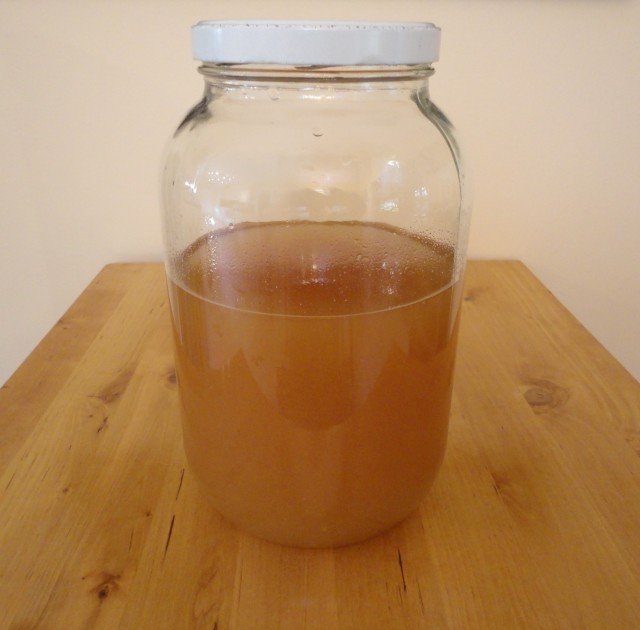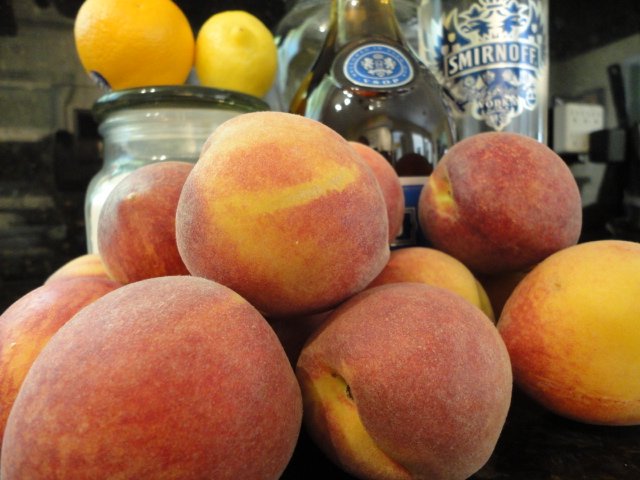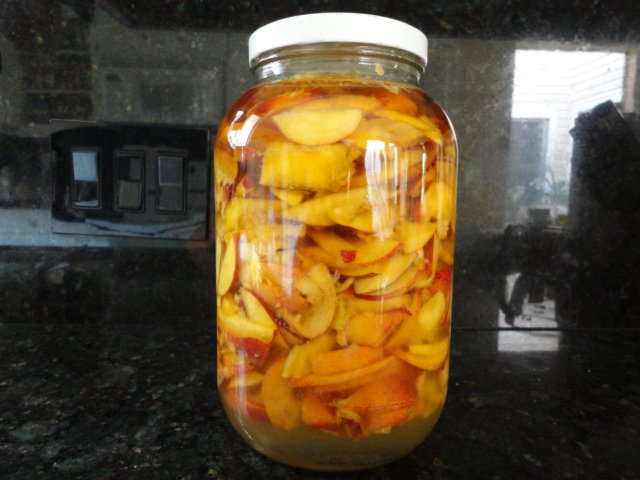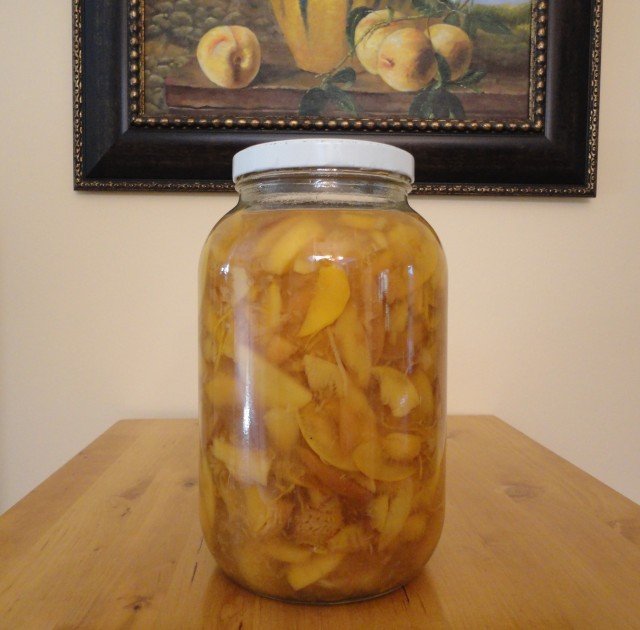Fresh picked peaches are one of the finest fruits to be enjoyed. Once you have had filled your craving of fresh peaches, having made peach jam, sorbet, ice cream and even baked a dessert or two, what else can you do with the extra peaches? How does one capture the essence of a perfectly sun ripened, juicy, chin dripping peach? For me, a person fascinated with making homemade liqueurs, creating homemade peach liqueur was the answer.
The effort to make homemade liqueurs is not difficult, but the behind the scenes chemistry that occurs in the sealed glass container when all of the ingredients mixed together does require patience. Thankfully this past month I have been extremely busy with work and have not had time to hover over the homemade peach liqueur that has been steeping in the closet.
As mentioned, the process to transform fresh peaches into a liqueur is easy, requiring the following steps: Prepare, Steep, Separate, Decant, Bottling and Time (Patience).
Ingredients:
- 2 Cups of Sugar
- 2 Cups of Water
- 4 Pounds of Fresh Washed Peaches
- 2 Teaspoons of Lemon Zest
- 2 Teaspoons of Orange Zest
- 3 Cups of 80 – 100 Proof Vodka
- 2 Cups of Brandy (If Brandy is not desired, then replace this ingredient with the same volume of Vodka)
- 8 Drops of Yellow Food Coloring
- 1 Tablespoon of Fruit Protector Powder
This recipe can easily be cut in half or even doubled depending on your desire, amount of peaches or the size of the glass container available.
Prepare: In a small pan, combine the water and sugar and heat on Medium-High, stirring regularly to prevent the sugar from burning until the sugar has dissolved. Allow the syrup to cool.
Remove the stems from the peaches, cut in half, remove the stone and then thinly slice the peach halves. If you have difficulty in removing the stone or the peach halves do not slice easily, do not worry. The effort does not have to result in perfectly sliced peaches. Ultimately, the purpose is to maximize the total surface area of the peach flesh to be exposed to the alcohol.
In a large glass container that has been thoroughly cleaned, add the sliced peaches, peach stones (optional, but does provide a hint of almond flavor), lemon zest, orange zest, yellow food coloring, syrup, fruit protector powder, vodka and brandy.
Seal the glass container, thoroughly shaking the contents so that it is well mixed.
Steep: Store the glass container in a cool dark location (back of a closet) for 2 – 4 weeks. This period of time allows for a portion of the alcohol to replace the juices in the peach flesh through the process of osmosis. You may want to shake the contents of the glass container once a week to maximize the extraction of the peach flavor. Do not be concerned if the top layer of sliced peaches turns a little brown. The browning is due to being exposed to air. Between the fruit preserving powder and the alcohol, there are no side effects.
Separate: Pour the contents of the glass jar through a wire mesh strainer to separate the sliced peaches, stones and the citrus zest into a glass bowl. To extract as much of the alcohol that has been infused into the peaches, then with a wooden spoon, mash the peaches against the wire mesh strainer.
Once you have strained the peaches then pour the peach liqueur contents back into the original glass container that you have washed and cleaned. Seal the container and store in the back of the closet for another two to four weeks. This period of time will allow for the smaller solids to settle to the bottom of the container.

Homemade Peach Liqueur Strained of Large Solids in a Glass Container (2-4 Additional Weeks of Resting Required Before Bottling)
Decant & Bottling: Given that the entire process to make homemade peach liqueur is a four to six week process, I felt it was important to post the first three steps now to provide instructions to those interested in making peach liqueur at home and have a supply of ripe peaches in which to use. I suggest coming back to this post in two to three weeks for the final set of instructions and pictures of the decanting and bottling of the peach liqueur.





28 comments
Skip to comment form
I love this recipe, and want to make it — but a word of caution; the almond smell in pit fruit pits is caused by cyanide, which is extremely toxic / fatal. In small doses, like this, it’s probably fine, but I would still avoid the pits of the fruit.
You can find evidence of this by a simple Google search
Since grain alcohol is such a strong solvent, it would particularly worry me.
Other than that, I’m probably going to try this recipe!
I would second that warning. My Grandmother had a little sister who died, as a toddler, from eating apricot pits because she was so hungry and they had little else (they were German Mennonites living in the Ukraine under Stalin).
any update? I have 2 64oz jars steeping, been 2 days
Author
Pete, At a minimum allow the peaches to steep for a month before straining the solids from the jars and then another month to allow the smaller solids to separate. I will be posting new pics of the bottle liqueur in a week or two.
I started the process recently but don’t want to get to the end and not know what to do. When will you be posting the final steps?
Exactly how much does one batch make?
If I make my peach liqueur now will it be ok at Christmas
Most fruity liqueurs only take about 4 to 6 weeks to give their flavours up to the base alcohol they sit in, however a few months, usually adds more depth to the liqueur. So, if you make peach liqueur now, it will have a good 3 and a half months to mature.
When will you post the final set of instructions for decanting and bottling? Ours is in the 2-4 weeks of resting.
Please give us instructions for the final steps. We are in week 4 of the resting phase
I am going to follow this recipe starting today. I have my fresh summer peaches thawing in the fridge. Question: Why do you not recommend mashing or blending up the fruit before adding to alcohol? Is it just to make straining easier or is there a more fundamental reason.
Also, call all vodka be used or does the brandy impart a flavor that is well worth it?
thanks.
Pam
Author
Pam,
The reason for not mashing or blending up the fruit is that when it is time to filter and strain the alcohol infused with the essence of the fruit there is a lot of difficulty in separating the fruit pulp from the alcohol. You will find that the coffee filters or cheese cloth clog easily slowing down the process of separation. The other part of reason is that although not impossible, but if you can create a liqueur free of fruit pulp particle suspended in the bottle, the results are stunning. However, there is no issue to quality if there is fruit pulp suspended in the liqueur.
One more question….cheap, mid, or better brandy?
Author
Cheap and save the bottle for bottling of your homemade liqueur. Please let me know how using thawed fresh frozen peaches works out for you. I have a feeling that your filtering / straining is going to be difficult.
Thank you for answering my questions. I decided to strain today since the peaches were frozen and some sources say frozen is fine and that it allows the steeping to go more quickly b/c the fruit cells open up more due to freezing and thawing. It is delicious! Thank you so much. I had frozen the 4 lbs of peaches with 1 cup of sugar in the summer. Due to the liquid produced by freezing and thawing I added no water or any more sugar.
As for straining….I am sure it is more of a problem. I can tell by just looking at your pictures and at my jar that there is a lot more peach breakdown in mine than in yours.
I first used a very good bouillon strainer (I use to make my Greek yogurt from the crock pot). Then a permanent coffee filter. Then a paper coffee filter. The first qt or so went quickly through the bouillon strainer. Then slowed down. The permanent coffee filter was fairly quick. but things have really slowed down with the paper coffee filters. I think I am using about 4-5 coffee filters per quart so far.
Oh and i added one cinnamon stick and one opened-and-scraped-into-the-mix vanilla bean to the steepage.
I only made this because I had so many gallons of peaches in my freezer and I am trying to use them up. I have never had peach liqueur before but I really like it. It is very delicious! Thanks for the tutorial.
Update on Straining
I compared the liqueur that had been strained by the bouillon strainer and then the permanent coffee filter to liqueur that was, in addition strained by paper coffee filters. There was hardly any discernable difference in clarity. Therefore, I abandoned the tedious paper filter straining. I ended up using Christian Bros Brandy from Costco.
It has a lovely full bodied mouth feel. If this improves with another 4 weeks of aging I am not sure it will make it to Christmas as gifts…..maybe I should start another batch.
hey bill love your peach liqeuer recipe ,,need final steps
can I please have the final steps?
Bill
For some time I have been looking for a recipe on how to make a liqueur using my favorite summer fruit, peaches. With good luck I found your recipe. But I count not find instructions how to decant and bottle the liqueur.
If you would be so kind as to provide the information I would be very appric
Bill
For some time I have been looking for a recipe on how to make a liqueur using my favorite summer fruit, peaches. With good luck I found your recipe. But I count not find instructions how to decant and bottle the liqueur.
If you would be so kind as to provide the information I would be very appreciative.
Thank you.
so far so GOOD but how about the final steps to decant and bottle this yummy looking peach liqueur??? please reply.. thanks Laurie
Was this project ever completed? I have beaucoup peaches and would like to try making the liqueur. What are the last steps, please.
Where are you posting the next steps? Why do you use brandy,I used vodka only?
Greetings,
I’m getting ready to strain mine and plan on letting it sit for another 4 weeks. Given this was posted in 2012 and it’s now 2016, did ANYONE get the final steps? Don’t want to wast two gallons worth of what looks to be super yummy liqueur. Thanks!
I am ready for the decanting and bottling process, but I can t find your directions.
thanks.
I totally forgot about my liquor – I put it in a cool dry spot in the house, and forgot to go to it. The fruit is still in the jar and it is about a year old. If I take out the fruit now, is the liquor still good? I don’t feel like getting sick nor getting any one else poisoned.
I once forgot about a blackberry liquor for over 10 years. The taste wasn’t that good, but it didn’t poison anyone.
That almond taste from including the peach pits is probably from the cyanide in the pits. Don’t know if enough would be extracted to cause any harm.